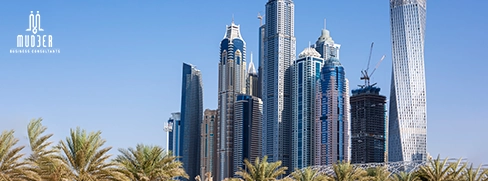
Starting a business in the United Arab Emirates (UAE) is a well-considered choice for investors and entrepreneurs from all over the world. The UAE offers several jurisdictions for company formation, most notably the Mainland and the Freezone. The UAE is renowned for its robust economy, business-friendly regulations, and global connections. Because each has specific benefits, rules, and restrictions, choosing one is essential to the success of your business.
Each option offers its own advantages, challenges, and flexibility. Understanding these differences can help you make the right decision based on your business goals, target market, and growth plans.
Mainland Company Formation refers to registering your business with the Department of Economic Development (DED) of the respective Emirate. Mainland companies are free to operate anywhere in the UAE. These companies are free to trade both domestically and abroad in the UAE.
A Freezone Business Setup in Dubai is the process of establishing your company inside a Free Zone, which is a designated economic zone. By offering enticing incentives and expedited corporate processes, these regions want to attract foreign investment. Dubai alone is home to more than 30 free zones, including Dubai Multi Commodities Centre (DMCC), Dubai Silicon Oasis (DSO), and Jebel Ali Free Zone (JAFZA).
Nature of Business
Target Market
Budget & Growth Plans
Location Preferences
Choosing between Freezone and Mainland setup is not a one-size-fits-all decision. At Mudeer, a leading Business set up consultant in Dubai, we provide personalized guidance to help you:
Ready to launch your company in the UAE?
Contact Mudeer Business Consultant today for expert support in choosing the right setup and streamlining your business formation.
1. Can I convert my Freezone company to a Mainland company later?
Yes, it is possible to convert or migrate your Freezone company to a Mainland company, but it involves specific legal procedures, approvals, and potentially a new trade license. It’s advisable to consult a business setup expert to evaluate the feasibility and costs involved in the conversion process.
2. Which is more cost-effective for startups: Mainland or Freezone?
Freezone setups are generally more affordable for startups due to lower office space requirements, streamlined processes, and bundled packages (license + visa + workspace). Mainland setups typically involve higher setup and operational costs, especially if you require larger office space and multiple visas.
3. What is included in the Dubai Free Zone License Cost?
It usually includes the trade license, company registration, shared office (if needed), and initial visa quota. Costs vary by Freezone, business activity, and number of shareholders.
4. Can a Freezone company open a branch in the UAE Mainland?
Yes, a Freezone company can establish a branch in the Mainland if it wishes to trade directly within the UAE. However, the branch must obtain a license from the Department of Economic Development (DED) and may need a local service agent.
5. What types of businesses are better suited for Mainland setups?
Businesses that deal with retail, real estate, restaurants, construction, logistics, healthcare, or local services are better suited for the Mainland due to their direct interaction with the UAE market and clients.